Negative Spirits and Bottle Trees in Africa: Cultural Significance and Origins
Bottle trees are homemade evil spirit containers that capture deep-rooted evil supernatural monsters.
Bottles and containers physical properties and symbolic meanings have contributed to the belief that they can confine and trap evil spirits. Discover the captivating world of bottle trees in Africa, where culture, spirituality, and artistic expression intertwine.
These unique handmade trees, adorned with colorful glass bottles, hold a special place in many regions of Africa. In this article, we delve into the cultural significance and origins of bottle trees, exploring the link between Africa's rich traditions and the practice of using discarded bottles as evil spirit catchers and recyclable art objects.
Bottle Trees in Africa, the Cultural Significance and Origins.
Bottle trees have a rich history and are deeply rooted in West and Southern African cultural, spiritual, and religious beliefs. Bottle trees represent a unique connection between humans and the natural and supernatural worlds.
In many African countries, such as Mali, Namibia, Tanzania, Ghana, Malawi, Mozambique, and South Africa, you may come across trees adorned with various colorful glass bottles. These trees are often referred to as bottle trees due to their distinctive appearance. The bottles are typically hung upside down from the branches or attached to the tree trunks.
Names for bottle trees in West and Southern Africa.
The Kpaglogo Tree is associated with the Ga people of Ghana. Kpaglogo trees are adorned with bottles and serve as a focal point for cultural and spiritual activities.
In other regions, bottle trees are called juju trees. The term juju refers to spiritual or magical powers and is associated with the belief that the bottles on the tree possess protective or mystical qualities.
The Dogon people in Mali have a rich spiritual and cultural heritage. They have a tradition of placing bottles on sacred trees as part of their religious rituals. These trees, known as Togu Na.
Fetish Tree, the term fetish in this context refers to an object believed to have supernatural powers or to serve as a conduit to the spiritual realm. Bottle trees may be referred to as fetish trees due to their association with spiritual beliefs and practices.
Spirit-Trap Tree; this name highlights the belief that bottle trees can act as traps for malevolent spirits or negative forces, preventing them from entering or causing harm to a specific area.
In communities where bottle trees are associated with religious or spiritual practices, they may be referred to as prayer trees due to their use as a place for offering prayers or making spiritual connections.
African tribes that use bottle trees and rituals associated.
There are several African tribes and cultural groups that incorporate bottle trees into their rituals and belief systems such as the Yao Tribe, Ga of Ghana, Zulu Tribe, Dogon and Himba Tribe.
The Yao tribe in Malawi, Mozambique, and Tanzania is known for their practice of decorating bottle trees. They believe that the bottles capture and trap evil spirits, protecting their communities and homes from harm. The trees are often adorned with colorful glass bottles, and the sound created by the wind passing through the bottles is believed to keep evil spirits away.
The Ga people in Ghana have a tradition known as Kpaglogo, which involves the use of bottle trees. Kpaglogo trees are decorated with bottles and serve as a focal point for cultural and spiritual activities. The trees are believed to symbolize the connection between the spiritual and physical realms, and they are associated with the veneration of ancestors and the performance of rituals.
The Zulu tribe in South Africa has a tradition of using bottle trees as part of their healing and divination practices. The bottles are filled with various objects, such as herbs, roots, or liquids, which are believed to possess spiritual powers. The bottles are hung on trees during rituals, and the practitioner may communicate with the spirits or ancestors through these bottles.
The Dogon people in Mali have a rich spiritual and cultural heritage. They have a tradition of placing bottles on sacred trees as part of their religious rituals. These trees, known as Togu Na, serve as gathering places for community meetings, spiritual ceremonies, and initiations. The bottles on the trees are considered symbolic representations of spiritual power and ancestral presence.
The Himba tribe in Namibia incorporates bottle trees into their healing rituals and ceremonies. The bottles are filled with herbs, oils, or other substances and are used as part of traditional medicine practices. The Himba people believe that the bottles can harness the healing properties of the natural elements and the spirits associated with them.
The origins of bottle trees in Africa are rooted in cultural beliefs and superstitions.
In some African cultures, bottle trees are associated with spiritual beliefs and superstitions. It is believed that the bottles can trap evil spirits or negative energies, protecting the households or communities. The sound produced when the wind blows through the bottles is also thought to ward off evil spirits.
In recent years, bottle trees have gained attention as a form of environmental conservation. Recycling bottles and incorporating them into tree decorations promotes recycling and reduces waste. This aspect aligns with the increasing global focus on sustainable practices and environmental consciousness.
The origins of bottle trees can be traced back to multiple cultural and historical influences. While the practice of using bottles as decorative elements on trees is found in various parts of the world, including Africa, the specific origins of bottle trees are not limited to a single source.
Today, bottle trees can be found in different parts of the world, each with its own unique interpretation and significance.
Bottle trees have cultural significance in certain regions of Africa. The practice of decorating trees with bottles may have originated in African communities, where discarded bottles were repurposed for both practical and aesthetic purposes. This cultural practice has likely spread to other parts of the world through migration, trade, and cultural exchange.
The African diaspora, particularly the transatlantic slave trade, played a role in spreading cultural practices across different continents. It is believed that African slaves brought their cultural traditions and beliefs, including the use of bottle trees, to the Americas. In some parts of the United States, such as the Southern states, bottle trees are found as a result of African cultural influences.
Bottle trees also have roots in European folklore, particularly in Mediterranean and Middle Eastern regions. In countries like Italy and Greece, it was believed that hanging colored glass bottles on trees would capture and trap evil spirits, preventing them from entering homes. This tradition was brought to the Americas by European immigrants, where it merged with African cultural practices.
Some Native American tribes in North America also had traditions involving the use of bottles or glass objects hung on trees. These practices were often associated with spiritual beliefs, protection, or ceremonial purposes. The interaction between Native American tribes and European settlers might have influenced the adoption of bottle tree traditions.
The origins of bottle trees in West Africa.
The origins of bottle trees in West Africa are not definitively known, as the practice predates written records and has been passed down through oral traditions. However, there are some theories and historical context that shed light on the possible beginnings of bottle trees in this region.
One theory suggests that bottle trees in West Africa may have originated from cultural beliefs and spiritual practices. Many West African cultures have a strong belief in animism, which is the attribution of a soul or spirit to plants, animals, and inanimate objects. It is believed that hanging bottles on trees helps to capture or trap malevolent spirits or negative energies. The sound produced by the wind passing through the bottles is believed to ward off evil spirits.
Another theory relates bottle trees to ancestral worship and veneration. Ancestors hold a significant place in many West African cultures, and they are often honored and revered. It is possible that bottle trees were used as a way to symbolically connect with and pay homage to ancestors. The bottles may represent offerings or a means of communication with the spiritual realm.
The transatlantic slave trade and subsequent African diaspora have likely played a role in spreading cultural practices, including bottle trees. It is possible that African slaves who were taken to the Americas brought their cultural beliefs and practices with them. The practice of using bottles on trees might have been maintained and evolved within African diaspora communities in the Americas, eventually influencing the continuation of bottle tree traditions in West Africa.
The exact beginnings of bottle trees in West Africa remain intertwined with the rich cultural history and spiritual beliefs of the region.
The origins of this belief can be traced to a combination of cultural, spiritual, and religious beliefs such as Animism and spiritual beliefs, folklore and mythology, rituals and protective practices, and symbolic representation.
The belief in animism, which attributes a soul or spirit to plants, animals, and inanimate objects, is a common feature in many indigenous cultures. In such belief systems, objects like bottles are seen as potential vessels for spirits, including both benevolent and malevolent ones. The belief that spirits can be trapped or contained in vessels like bottles stems from this animistic worldview.
Folklore and mythology often contain stories and legends about spirits, demons, and other supernatural entities. In some tales, it is said that spirits or malevolent beings can be captured or controlled using specific objects, including bottles or containers. Over time, these stories may have influenced cultural beliefs and practices related to trapping spirits in vessels.
Many cultures have developed rituals and protective practices aimed at warding off evil spirits or negative energies. The use of bottles or containers to capture or trap these entities can be seen as a form of protective magic or spiritual defense. By sealing the spirits within a confined space, people believe they can prevent them from causing harm or entering certain areas.
Bottles and containers have long been associated with containment, preservation, and control. Their physical properties and symbolic meanings have contributed to the belief that they can confine and trap spirits. The idea of using a closed container to keep something contained or locked away is a concept that can be easily extended to spiritual beings.









